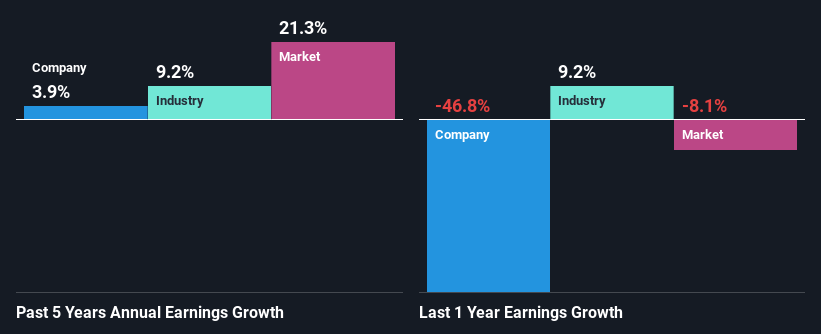Rocky Mountain Liquor Inc.'s (CVE:RUM) Stock is Soaring But Financials Seem Inconsistent: Will The Uptrend Continue?
Rocky Mountain Liquor's (CVE:RUM) stock is up by a considerable 78% over the past three months. But the company's key financial indicators appear to be differing across the board and that makes us question whether or not the company's current share price momentum can be maintained. In this article, we decided to focus on Rocky Mountain Liquor's ROE.
Return on equity or ROE is a key measure used to assess how efficiently a company's management is utilizing the company's capital. In simpler terms, it measures the profitability of a company in relation to shareholder's equity.
View our latest analysis for Rocky Mountain Liquor
How Do You Calculate Return On Equity?
The formula for ROE is:
Return on Equity = Net Profit (from continuing operations) ÷ Shareholders' Equity
So, based on the above formula, the ROE for Rocky Mountain Liquor is:
3.1% = CA$273k ÷ CA$8.8m (Based on the trailing twelve months to September 2023).
The 'return' is the amount earned after tax over the last twelve months. So, this means that for every CA$1 of its shareholder's investments, the company generates a profit of CA$0.03.
What Is The Relationship Between ROE And Earnings Growth?
We have already established that ROE serves as an efficient profit-generating gauge for a company's future earnings. Based on how much of its profits the company chooses to reinvest or "retain", we are then able to evaluate a company's future ability to generate profits. Generally speaking, other things being equal, firms with a high return on equity and profit retention, have a higher growth rate than firms that don’t share these attributes.
Rocky Mountain Liquor's Earnings Growth And 3.1% ROE
It is quite clear that Rocky Mountain Liquor's ROE is rather low. Not just that, even compared to the industry average of 17%, the company's ROE is entirely unremarkable. Therefore, the disappointing ROE therefore provides a background to Rocky Mountain Liquor's very little net income growth of 3.9% over the past five years.
Next, on comparing with the industry net income growth, we found that Rocky Mountain Liquor's reported growth was lower than the industry growth of 9.2% over the last few years, which is not something we like to see.
Earnings growth is a huge factor in stock valuation. What investors need to determine next is if the expected earnings growth, or the lack of it, is already built into the share price. By doing so, they will have an idea if the stock is headed into clear blue waters or if swampy waters await. Is Rocky Mountain Liquor fairly valued compared to other companies? These 3 valuation measures might help you decide.
Is Rocky Mountain Liquor Making Efficient Use Of Its Profits?
Rocky Mountain Liquor doesn't pay any dividend currently which essentially means that it has been reinvesting all of its profits into the business. This doesn't explain the low earnings growth number that we discussed above. So there could be some other explanation in that regard. For instance, the company's business may be deteriorating.
Summary
On the whole, we feel that the performance shown by Rocky Mountain Liquor can be open to many interpretations. While the company does have a high rate of reinvestment, the low ROE means that all that reinvestment is not reaping any benefit to its investors, and moreover, its having a negative impact on the earnings growth. Wrapping up, we would proceed with caution with this company and one way of doing that would be to look at the risk profile of the business. Our risks dashboard would have the 3 risks we have identified for Rocky Mountain Liquor.
Have feedback on this article? Concerned about the content? Get in touch with us directly. Alternatively, email editorial-team (at) simplywallst.com.
This article by Simply Wall St is general in nature. We provide commentary based on historical data and analyst forecasts only using an unbiased methodology and our articles are not intended to be financial advice. It does not constitute a recommendation to buy or sell any stock, and does not take account of your objectives, or your financial situation. We aim to bring you long-term focused analysis driven by fundamental data. Note that our analysis may not factor in the latest price-sensitive company announcements or qualitative material. Simply Wall St has no position in any stocks mentioned.

